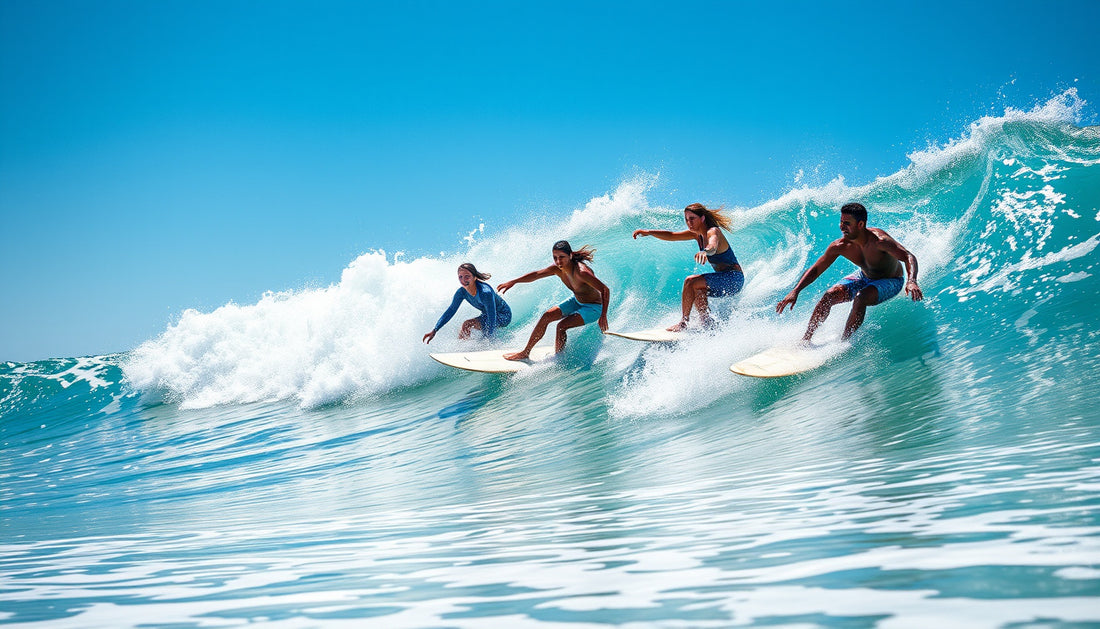
Riding the Wave: How Surfing is Shattering Mental Health Stereotypes and Promoting Healing
Share

Mental health is a topic that has long been surrounded by stigma and misunderstanding. Despite growing awareness, many people still wrestle with misconceptions that hinder open conversations and seeking help. What if an ancient practice, seemingly far removed from clinical therapy, could empower mental health healing and dismantle stereotypes? Enter surfing—a sport that is not only a physical challenge but also a powerful mental health ally.
Surfing: More Than Just a Sport
At first glance, surfing might seem like merely a thrilling outdoor activity—catching waves, feeling the ocean’s power, and enjoying the sun. However, behind the exhilaration lies a deeper connection with nature and self-awareness that contributes tremendously to mental wellbeing.
Mental health myths surfed aside by riding the waves:
-
Myth: Mental health issues are a sign of weakness.
Surfing challenges this by showcasing resilience and courage. It takes bravery to face the unpredictable ocean every day, much like confronting mental health struggles. -
Myth: Therapy is the only way to heal.
While therapy is invaluable, physical activities like surfing complement healing by providing stress relief, improving mood, and building community. -
Myth: People with mental health challenges are isolated or withdrawn.
The surfing community dispels this, fostering connection, support, and shared joy among surfers from all backgrounds.
The Science Behind Surfing and Mental Health
Engaging with the ocean triggers a cascade of positive brain chemicals and physiological reactions:
- Endorphin release: Physical activity increases these 'feel-good' hormones, reducing depression and anxiety symptoms.
- Mindfulness and flow state: Surfing demands focused attention on the waves, promoting present-moment awareness similar to mindfulness meditation.
- Vitamin D absorption: Sunlight boosts Vitamin D, which supports brain health and mood regulation.
- Natural therapy: Exposure to 'blue spaces' like the ocean has been linked to lower stress levels and improved recovery from mental fatigue.
Dr. Lindsey J. Thompson, a clinical psychologist and surfing advocate, states:
'Surfing offers a unique blend of physical challenge, social connection, and nature immersion, which can profoundly benefit individuals struggling with depression and anxiety.'
Real Stories: Surfing as a Path to Healing
Consider the example of Jake, a veteran coping with PTSD, who found solace in surfing after traditional treatments stalled. 'The ocean doesn’t judge,' he shares. 'When I’m out there, it’s just me and the wave. It’s healing in a way I never expected.'
Similarly, many mental health organizations are incorporating surfing programs tailored for vulnerable populations, recognizing its therapeutic potential and accessibility.
Riding the Wave Forward: How Can You Get Involved?
- Try surfing at local beginner-friendly beaches to experience firsthand the mental health benefits.
- Support or volunteer with surf therapy organizations that enable at-risk groups to access the ocean’s healing power.
- Advocate for integrating outdoor activities like surfing into mental health programs and policies.
- Speak openly about your mental health journey and explore alternative healing practices that resonate with you.
Final Thoughts: Are We Ready to Change the Narrative?
Isn't it time we broadened our understanding of mental health healing beyond the clinical room? Surfing challenges us to embrace vulnerability, resilience, and community—core elements in breaking mental health stigma.
As environmentalist and big-wave surfer Bethany Hamilton puts it:
'The ocean has taught me about fear, courage, and healing. It’s a reflection of life’s waves—sometimes calm, sometimes wild—but always offering a chance to rise again.'
So, are you ready to ride the wave? Whether on a board or through new perspectives, let's champion a future where mental health is met with openness, support, and innovative healing.
Call to Action:
If you or someone you know is struggling with mental health, consider exploring surfing or outdoor activities as a complementary path to healing. Reach out to local surf therapy groups or mental health professionals to find supportive communities. Together, we can shatter stereotypes and ride the wave toward better mental health for all.






